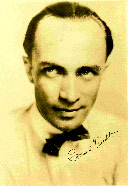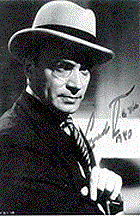
The Conrad Veidt Society
This statement precedes the articles published over four weeks from October 14th to November 4th, 1933, in the Sunday Dispatch, and is signed by Conrad Veidt:

Conrad Veidt
I have agreed at last to publish my "confession".
This is a most sober and important occasion for me. I do want everyone to realise
that my story has nothing to do with any kind of so-
I have had many offers for the publication of the usual "life story", and I have always had to refuse. This story is as I have told it privately to a personal friend, and I have agreed to allow her to set it down. There is no question of payment. It would be impossible for me to sell the feelings of the man Conrad Veidt.
The story appears once and will appear in no other form..
These are my reasons for allowing the publication: I wish, naturally to prevent the possibility that someone may write an accidental, superficial, incomplete and perhaps untrue picture of me. But the main reason for my consent is a feeling of sincerest gratitude.
Recently so many people have paid me tribute for my work, have given me their sympathy
and even their friendship -
—Conrad Veidt.
..................................
Statement by "Sunday Dispatch":
Conrad Veidt, one of the truly great actors of the screen, tells his story. He has allowed a personal friend to set it down as he told it, privately. He will hear of no payment. All he demands now that at long last he is allowing his story to be told, is that he shall read every word of it to make sure that it is accurate. Every word is carefully scrutinised by Conrad Veidt, to make sure the story is accurate in fact and in spirit.
THE STORY OF CONRAD VEIDT
SUNDAY DISPATCH, OCTOBER 1934
Conrad VeidtNo, I was not born with a monocle in my eye. I am not anything you may
have imagined after seeing my pictures. Believe me, I am the ordinary human being,
the usual complex, insulated, mysterious, many-
I could go on like this for a long time, but these stray sentences selected at random from my thoughts will show that I have learned to accept all as it comes, discarding the bad, garnering the good with the same kind of outlook. Other men have hobbies. They collect stamps, pictures, china, play golf or bridge or go to the movies. I am not like this. I specialise in no branch of life, and I have few preferences, few active dislikes. If you were to ask me at this moment what gets under my skin and annoys me, I don't think I should be able to tell you.
The one thing I look for everywhere is beauty. I find it everywhere, and in
almost every person. A lovely painting, a good book, or music moves me. It has a
life of its own. But I get just as satisfying a thrill when I look at streets wet
with rain or see a typist's quick fingers traveling with precision over her keyboard.
I am told so often that I have come to believe it -
Looking back across the years, so many pictures flash on the screen of my memory
that just as I begin to see one clearly, another slides in, blotting out the first,
itself to be pushed aside by the next and the next and the next. So that I am left
with a confused piece of tapestry where the design should be really bold and vivid.
For my life has been like that, straightforward, steady, myself moving against the
simplest, most direct background. For I refuse to take any credit for my success.
I have been exceptionally fortunate in four respects. I had burning ambition; which
takes you a quarter of the way. I had a will to succeed so highly developed that
it became stronger than myself. I have been exceptionally lucky. I never had to
go on tour or struggle for a job, or starve in a garret, or wait for the lucky break,
or serve any other apprenticeship than in one of the finest schools of acting in
the world, the Deutsches Theatre, owned and run by Max Reinhardt, whom I regard as
the greatest stage genius of our time. I learned the technique of my job among the
really great German actors and personalities -
The most prosaic of us have our articles of faith, some of us call them fetishes or superstitions. This transmutation of my own spirit is my paramount article of faith. In many actors the man and the actor are so indistinguishable that you can hardly tell where the man begins and the actor leaves off. Not so with me. Perhaps because of this quality I have tried to describe the man in me is sharply divided from the actor. And here, looking back at the picture taking shape in my mind, the pattern becomes even more blurred. I see that my own nature has woven its own curious curves and colours into the austerity of the design. Four women and one child have been the dominating influences in my life.
But let me begin the story as it started in a little house in North Berlin on January 22, 1893.
My birth neither shook the German Empire nor caused much of an upheaval in the
home. It pleased mother, caused father a certain amount of pride and my elder brother
the usual fraternal jealousy of a hitherto only son. My father was the equivalent
of a Civil Servant in this country. The typical father and husband of the middle
class believing in two things -
Of my mother it is not so easy to write. Although she died many years ago, I cannot think of her for a fleeting second without the deepest emotion. She was everything in the world to me. From the time that my elder brother died at nine years old she poured out on me all her love and exquisite understanding. She was protective inspiring, helpful, tolerant, friendly and loving. Our relationship was perfect. Her influence on my life had been incalculable.
The Story of Conrad Veidt
SUNDAY DISPATCH, OCTOBER 1934